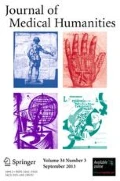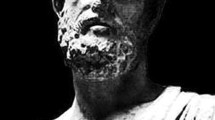“Nothing is darker or more menacing, or harder to accept, than the participation of physicians in mass murder ... He or she is still supposed to be a healer—and one responsive to a tradition of healing, which all cultures revere and depend upon.” Robert Jay Lifton, The Nazi Doctors
Abstract
During the Nazi era, most German physicians abrogated their responsibilities to individual patients, and instead chose to advocate the interests of an evil regime. In so doing, several fundamental bioethical principles were violated. Despite gross violations of individual rights, many physicians went on to have successful careers, and in many cases were honored. This paper will review the case of Hans Sewering, a participant in the Nazi euthanasia program who became the President-elect of the World Medical Association. The appropriate stance for the medical and scientific community toward those who violate human rights and ignore fundamental ethical principles of the healing professions will be considered.
Similar content being viewed by others
References
Annas, George J. and Grodin, Michael A. 1992.The Nazi Doctors and the Nuremberg Code. New York: Oxford University Press.
Caplan, Arthur L. 1992.When Medicine went Mad: Bioethics and the Holocaust. Totowa, New Jersey: Humana Press.
Taylor, Telford. 1946. “Opening Statement of the Prosecution.”Trials of War Criminals Before Nuremberg Military Tribunals Under Control Law No. 10, The Medical Case (Washington D.C.: U.S. Government Printing Office), 1:27–75.
Pellegrino, Edmund and Thomasma, David C. 1993.The Virtues in Medical Practice. New York: Oxford University Press.
Lifton, Robert Jay. 1986.The Nazi Doctors: Medical Killing and the Psychology of Genocide. New York: Basic Books.
Mueller-Hill, Benno. 1988.Murderous Science: Elimination By Scientific Selection of Jews, Gypsies and Others in Germany. Oxford: Oxford University Press.
Proctor, Robert. 1992. “Nazi Doctors, Racial Medicine, and Human Experimentation.” InThe Nazi Doctors and the Nuremberg Code, ed. George J. Annas and Michael A. Grodin. New York: Oxford University Press.
Seidelman, William. 1992 “Medspeak for Murder” InWhen Medicine went Mad: Bioethics and the Holocaust. ed Arthur L. Caplan. Totowa, New Jersey: Humana Press.
Caplan Arthur L. 1992. “The Doctor's Trial and Analogies to the Holocaust in Contemporary Bioethical Debates.” InThe Nazi Doctors and the Nuremberg Code, ed. George J. Annas and Michael A. Grodin. New York: Oxford University Press.
Kater, Michael. 1990.Doctors under Hitler. Chapel Hill: University of North Carolina Press.
Proctor, Robert. 1988.Racial Hygiene: Medicine under the Nazis. Cambridge: Harvard University Press.
Shevell, Michael. 1992. “Racial hygiene, active euthanasia, and Julius Hallervorden.”Neurology 42:2214–19.
Kennedy, Foster. 1942. “The Problem of Social Control of the Congenitally Defective: Education, Sterilization and Euthanasia.”Am J Psychiatry 99:13–16.
Pross, Christian. 1992. “Nazi Doctors, German Medicine, and Historical Truth.” InThe Nazi Doctors and the Nuremberg Code, ed. George J. Annas, and Michael A. Grodin. New York: Oxford University Press.
Seidelman, William. 1985. “The Professional Origins of Dr. Joseph Mengele.”Canadian Med Assoc. J. 133:1169–71.
Gallagher, Hugh. 1990.By Trust Betrayed: Physicians and the License to Kill in the Third Reich, New York: Holt and Co.
Mitscherlich, Alexander, and Fred Mielke. 1949.Doctors of Infamy: The Story of the Nazi Medical Crimes. New York: Henry Schuman.
Maretzki Thomas W. 1989. “The Documentation of Nazi Medicine by German Medical Sociologists. A Review Article.”Social Science and Medicine 29:1319–1330.
Levine, Carol. 1984. “What's In a Name? The Eppinger prize and Nazi experiments.”Hastings Center Report 14 No. 6:3–4.
Spiro, Howard M. 1984. “Eppinger of Vienna: scienna: scientist and villain?”J. of Clinical Gastroenterology 6:493–497.
Grodin, Michael A., George J. Annas and Leonard H. Glanz, “Medicine and Human Rights: A Proposal for International Action.”Hastings Center Report 23 No. 4:8–12, 1993.
Kandela, Peter. 1993. “WMA Crisis Averted.”Lancet 342:Jan 30, 298.
Sullivan Patrick. 1993. “Allegations About Nazi Past Force Resignation of WMA president-elect.”Canadian Med Assoc J. 148:995–6.
Whitney, Craig R. 1993. “Top German Doctor Admits SS Past.”New York Times. Jan 16 P3.
Tuffs, Annette. 1993. “Germany: Troubles in Medical Association.”Lancet 342:297.
Wikler, Daniel and Jeremiah Barondess. 1993. “Bioethics and Anti-Bioethics in Light of Nazi Medicine: What Must We Remember?”Kennedy Inst. of Ethics J. 3:39–55.
Rosenbaum, Alan S. 1993.Prosecuting Nazi War Criminals. Boulder: Westview Press.
Richardson EP. 1990. “Julius Hallervorden.” InFounders of Child Neurology, ed. Ashwal S. San Francisco: Norman Publishing 506–512.
Mitscherlich, Alexander and Fred Mielke. 1992. “Epilogue: Seven Were Hanged.” InThe Nazi Doctors and the Nuremberg Code, ed. George J. Annas and Michael A. Grodin. New York: Oxford University Press.
Grodin, Michael A. 1992. “Historical Origins of the Nuremburg Code.” InThe Nazi Doctors and the Nuremberg Code, ed. George J. Annas and Michael A. Grodin. New York: Oxford University Press.
Alexander, Leo. 1949. “Medical Science Under Dictatorship.”N. Engl J Med. 241:39–47.
Hilberg, Raul. 1992.Perpetrators, Victims, Bystanders. New York: HarperCollins.
Weisel, Elie. 1992. “Foreword” InThe Nazi Doctors and the Nuremberg Code, ed. George J. Annas and Michael A. Grodin. New York: Oxford University Press.
Author information
Authors and Affiliations
Rights and permissions
About this article
Cite this article
White, L.W. The Nazi doctors and the medical community; Honor or censure? The case of Hans Sewering. J Med Hum 17, 119–135 (1996). https://doi.org/10.1007/BF02276813
Issue Date:
DOI: https://doi.org/10.1007/BF02276813




